HostGator vs GoDaddy 2024 Comparison: Which One Is Better?
Our independent research projects and impartial reviews are funded in part by affiliate commissions, at no extra cost to our readers. Learn more
When it comes to choosing a web hosting provider, HostGator and GoDaddy are certainly in the conversation. In fact, they are two of the better-known options on the market, but which one is better?
The short answer is HostGator for its competitive pricing and excellent uptime. The short answer doesn’t always provide the most context, though. That’s why we’ve got the lowdown on all things HostGator and GoDaddy, matching them up side by side to see their strengths and weaknesses.
| HostGator is better for you if … | GoDaddy is better for you if … |
|---|---|
| You value excellent customer support, reliable uptime, and user-friendly interfaces. | You prefer simple domain registration and integrated website builder tools for convenience. |
HostGator vs GoDaddy: Comparison Table
| Criteria | HostGator | GoDaddy |
|---|---|---|
| Customer support | Excellent support with 24/7 live chat, phone assistance, and a knowledge base, and tech tickets for hands-on help. | Strong support with 24/7 live chat, phone support, and a help center, but no use of tech tickets. . |
| Uptime | Reliable uptime exceeding 99.9% for optimal website performance. | Strong uptime, with 99.9%. |
| User-friendliness | Intuitive interfaces for easy website management and navigation. | User-friendly tools with a focus on simplicity. |
| Pricing | Competitive pricing plans starting at $2.75 with generous money-back guarantee of 45 days. | Affordable packages starting at $6.99, with frequent discounts and promotions. |
User Interface
It’s one thing having all the bells and whistles in terms of features, but you need to be able to access them with relative ease. When it comes to user interface, HostGator and GoDaddy aim to please with intuitive, easy-to-use experiences. How they approach each, however, is a little different.
HostGator goes for highly functional interfaces with plenty of features like one-click installs for popular CMS platforms. Its cPanel balances power with ease of use through smart categorizations and guided workflows for managing domains, emails, storage, security, and much more.
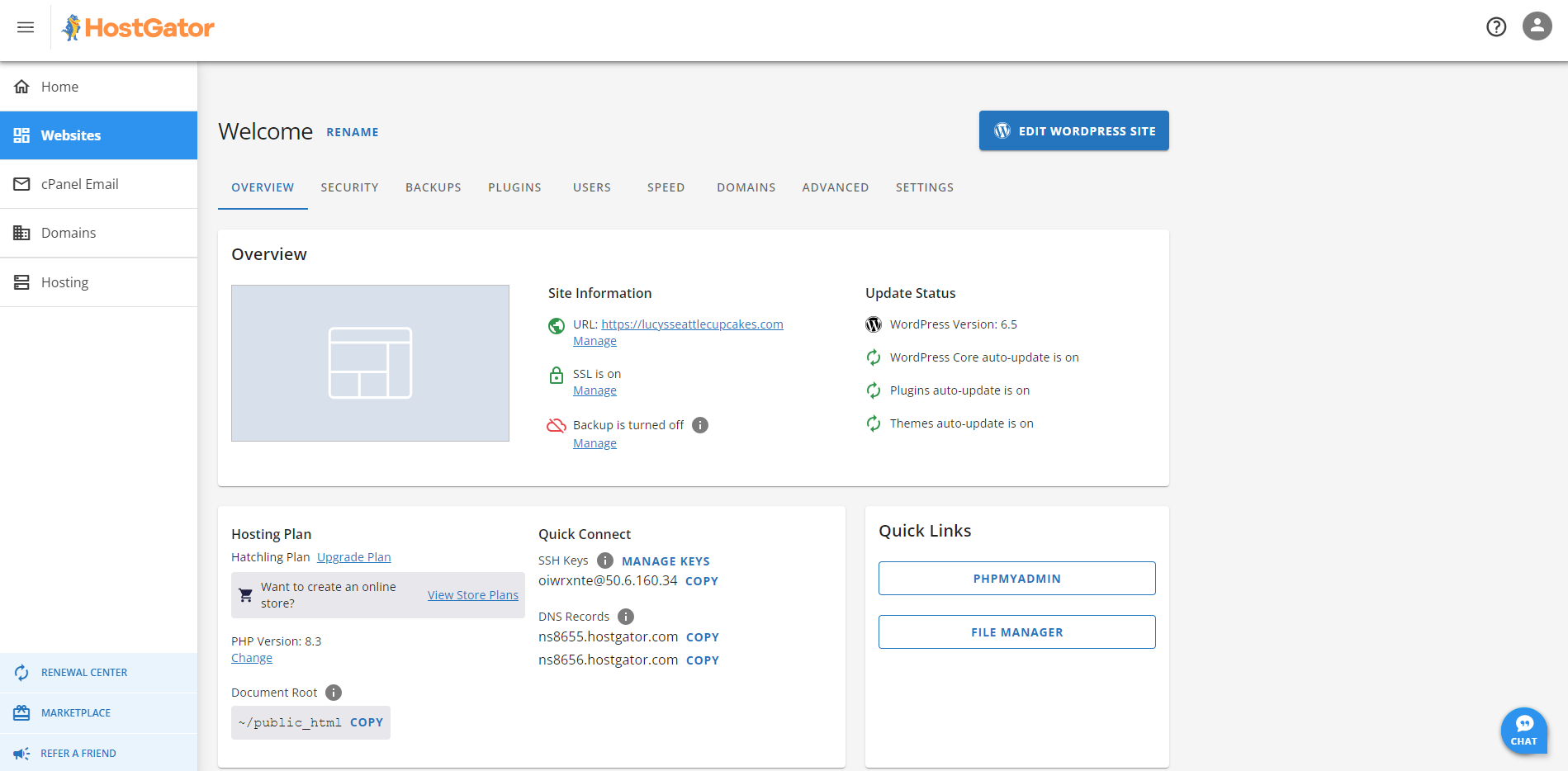
GoDaddy, on the other hand, provides user-friendly tools prioritizing simplicity and fast setup above all else. Its pared-down dashboards and stripped-down site builder are designed to get something out of the box quickly. This is especially helpful for small sites with straightforward needs.
Moreover, both platforms offer tutorials and a knowledge base to give users the lowdown on their services. HostGator has a ton of helpful written manuals, but GoDaddy may be the better choice for some here thanks to its simple visual guides and video walkthroughs for first-time users.
It means that users of all skill levels can comfortably access the full functionality needed to manage their online presence. For site owners without any experience, GoDaddy goes one step further and simplifies the initial onboarding process thanks to its quick setup Wizard.
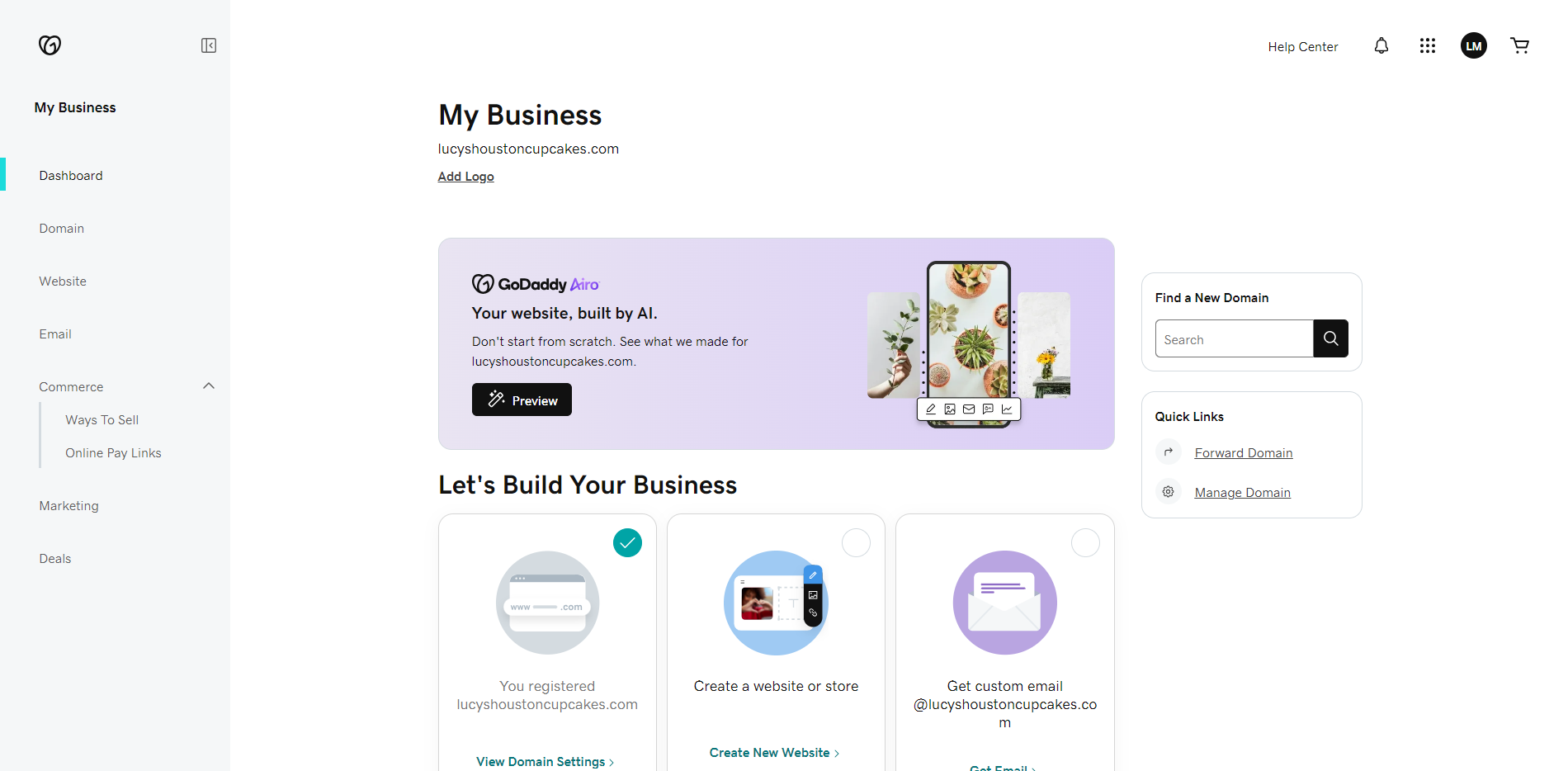
HostGator gives its users more tools to leverage straight away, meaning greater power. But GoDaddy helps less tech-savvy users get started without needing to go through complex processes.
The Winner
The winner is GoDaddy for its user interface and beginner-friendly setup
Price and Value for Money
Pricing and value for money are two key components for any decision regarding web hosting providers. Both options on the table offer a wide range of plans and pricing tiers across shared hosting, VPS, dedicated hosting, and more.
If you’re after straightforward shared hosting, HostGator shines over GoDaddy. Its starting shared hosting plan costs just $2.75 per month and packs with it unmetered storage, a free SSL certificate, and unlimited emails—pretty good value compared to GoDaddy’s plans starting at $5.99 per month.
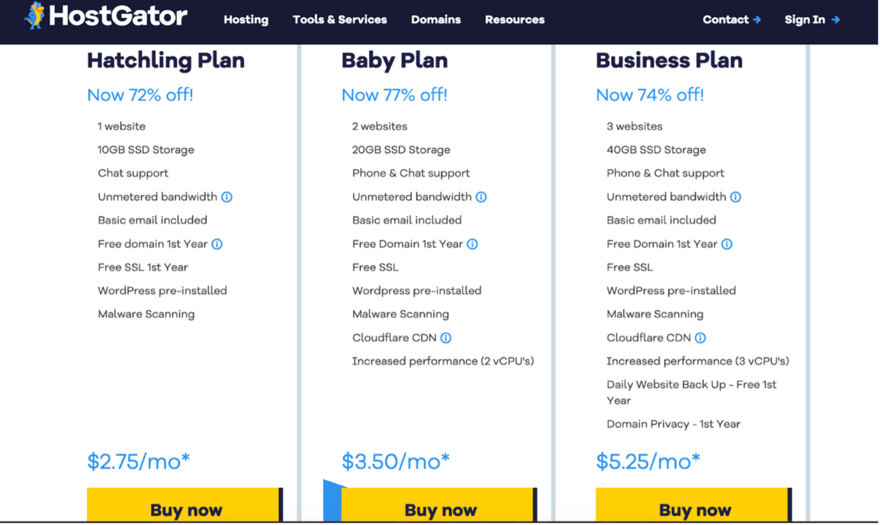
Though GoDaddy offers basic plans for smaller needs, HostGator provides greater long-term scalability, resources, and transparency in its feature-rich packages. Not to mention, it offers an impressive 45-day money-back guarantee compared to GoDaddy’s 30 days.
More information
- Check out our HostGator pricing review for a more detailed look at costs and plans.
- Take a look over GoDaddy’s Hosting Costs in even more detail in our full pricing review.
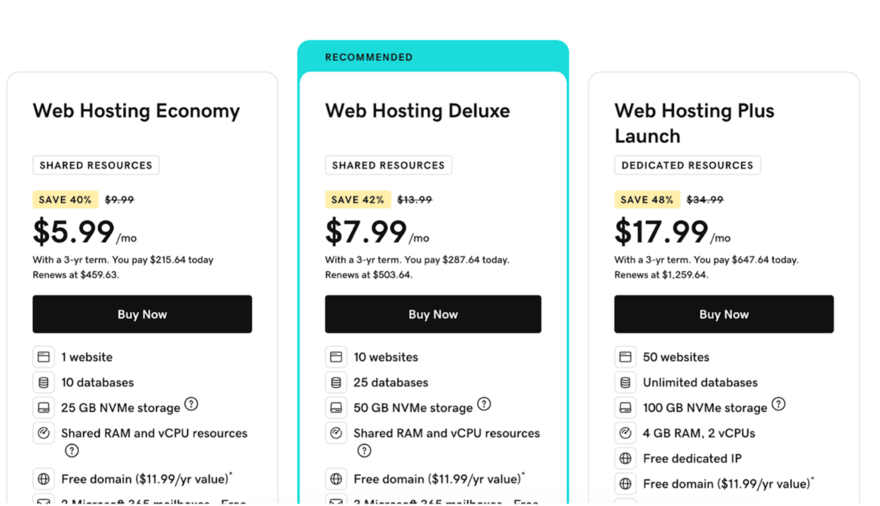
Both platforms offer introductory discounts, which means your prices will increase after the initial period finishes. HostGator’s Baby Plan for shared hosting, for example, gives you 77% off with its introductory price. It’s a good offer but quite the jump when it renews after 36 months.
GoDaddy is similar, although its renewal price – of slightly more than 50% – isn’t quite as steep as HostGator’s. Some, however, may find GoDaddy’s frequent pushes to get users to include add-ons and premium packages frustrating, especially as HostGator offers a more predictable, straightforward pricing structure term-after-term.
The Winner
The winner is HostGator thanks to its cheaper starting prices
Performance and Scalibility
Both HostGator and GoDaddy offer an impressive 99.9% uptime, so you can expect minimal interruption. Beyond that, there are 24/7 monitoring and fast response support teams ready to solve any emerging server issues if they arise.
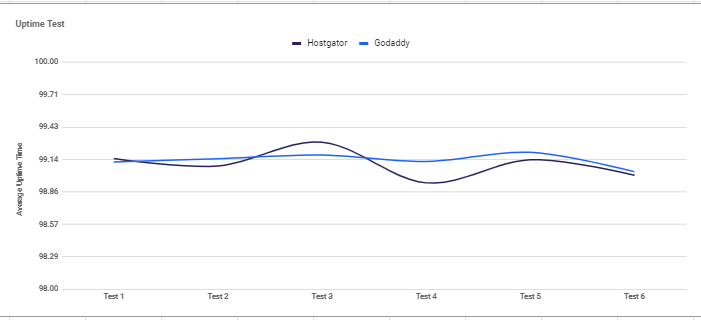
HostGator and GoDaddy also supply flexible shared hosting plans that you can upgrade if needed. For example, HostGator’s cheapest hosting plan has 10GB SSD storage, but the next option doubles to 20GB. So if you need to upgrade, it’s simply a case of managing your hosting plans in the cPanel.
Likewise, you can upgrade plans on GoDaddy should you decide to go for more storage, databases, or the number of websites you’d like to run. For bandwidth-intensive sites anticipating quick, substantial scales of growth, GoDaddy’s cheapest plan provides a larger initial SSD (25GB) compared to HostGator (10GB).
Both also offer a Content Delivery Network (CDN), which is a network of servers designed to deliver web content and pages to users more quickly and efficiently. To top it off, there are security features (more on that shortly) and site transfers.
As for website builders, GoDaddy offers a simple drag-and-drop option. HostGator, on the other hand, has stopped offering its website builder to new sign-ups.
The Winner
The winner is HostGator, with consistent uptime and responsive support
More Information
- See our full GoDaddy review to see how it stacks up across the board as a website hosting service
Features
| Features | HostGator | GoDaddy |
|---|---|---|
| Uptime guarantee | 99.9% uptime guarantee | 99.9% uptime guarantee |
| Server monitoring | 24/7 monitoring for fast issue resolution | 24/7 monitoring for fast issue resolution |
| Support teams | Responsive support teams for efficient assistance, including tech tickets | Strong support with plenty of resources. |
| Plan scalability | Three flexible shared hosting plans for easy upgrades | Four scalable plans to accommodate growing needs |
| Storage options | SSD storage options for improved performance | SSD storage options for improved performance |
| Content delivery network | Included CDN for faster content delivery | Included CDN for faster content delivery |
| Security features | Robust security measures for data protection | Robust security measures for data protection |
| Website builders | No website builder for new users | Website builders tailored for different needs |
A web host’s capabilities allow or limit what your online presence can ultimately become. The right features open pathways to scalability, security, speed—all factors that help your website grow its audience and revenue over time.
HostGator provides secure SSH access to servers, so technical users have full control over custom configurations. It supports over 500 scripts and web applications, including WordPress, Drupal, Joomla, Magento, and WooCommerce. These make launching content management systems, forums, ecommerce stores, and blogs a fairly straightforward process.
It also has dedicated IP addresses to improve site speed and prevent shared IP issues. For traffic spikes, its cloud and VPS hosting options provide automatic vertical and horizontal scaling to allocate resources based on demand. CDN integration through Cloudflare and a free SSL certificate are handy to help improve site performance and security.
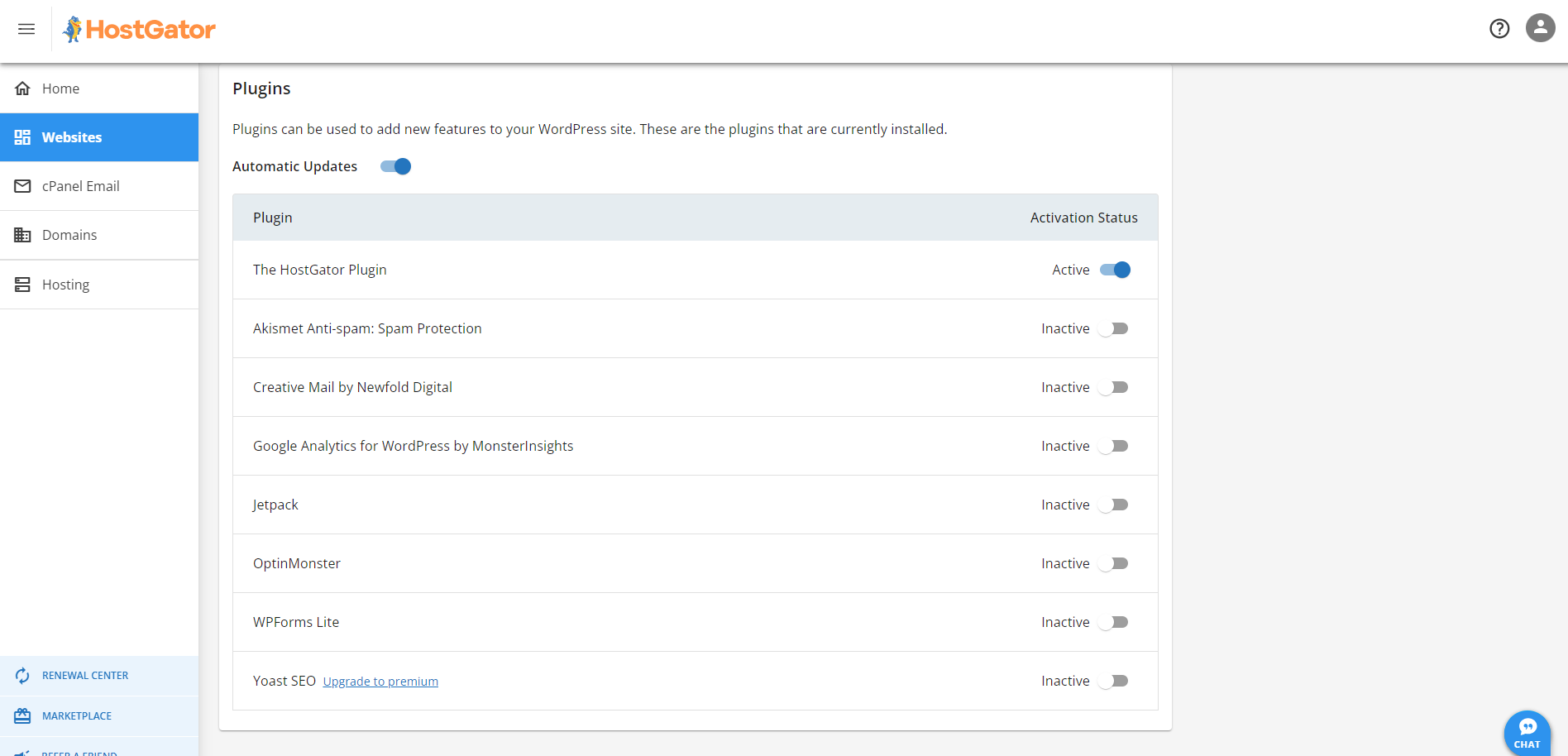
Equally, GoDaddy supports launching popular CMS platforms like WordPress. Its core strength, however, lies in ecommerce—with 55-plus integrated payment gateways, including Apple Pay, Google Pay, Stripe, and PayPal, for global sales reach and flexibility.
Things like SSL certificates and PCI compliance make the setup process smooth, and the beginner-friendly website builder allows for the drag-and-drop creation of websites along with SEO optimization options. For traffic increases, GoDaddy provides basic load balancing across multiple servers to minimize downtime.
As for email, HostGator offers five standard accounts usable with any email software. But GoDaddy also provides a free year-long subscription to Microsoft Office 365 business email and spreadsheets on all basic shared hosting plans. So if you’re a small business owner, it means you can access enterprise-grade email and documents at no additional charge. HostGator has comparable email functionality but doesn’t include the full Microsoft Office suite by default.
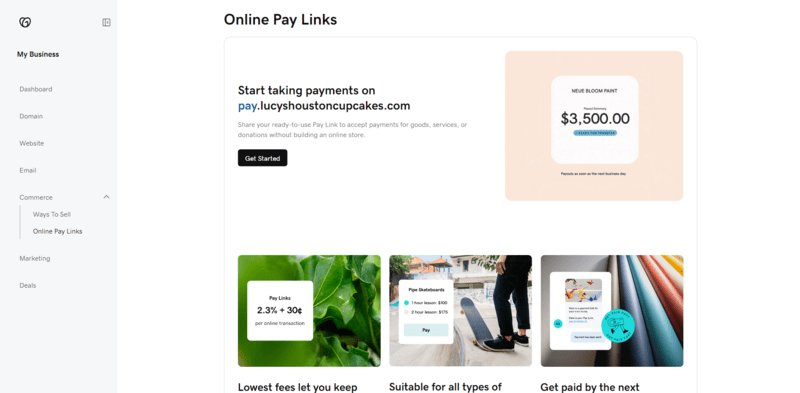
The Winner
The winner is HostGator due to more integrations and flexibility
More Information
- Take a look at our full HostGator review to see how it performs.
Security
Security is top of mind for any website owner, which means web hosting providers need to make sure everything they offer is watertight. Both HostGator and GoDaddy implement those all-important security measures to protect hosted websites against cyber threats and attacks, but who does what?
HostGator provides a 12-month free Shared SSL certificate to encrypt data on all plans, along with a dedicated IP address for improved security. It also has optional Private SSL and Code Signing certificates for ecommerce sites processing sensitive customer information.
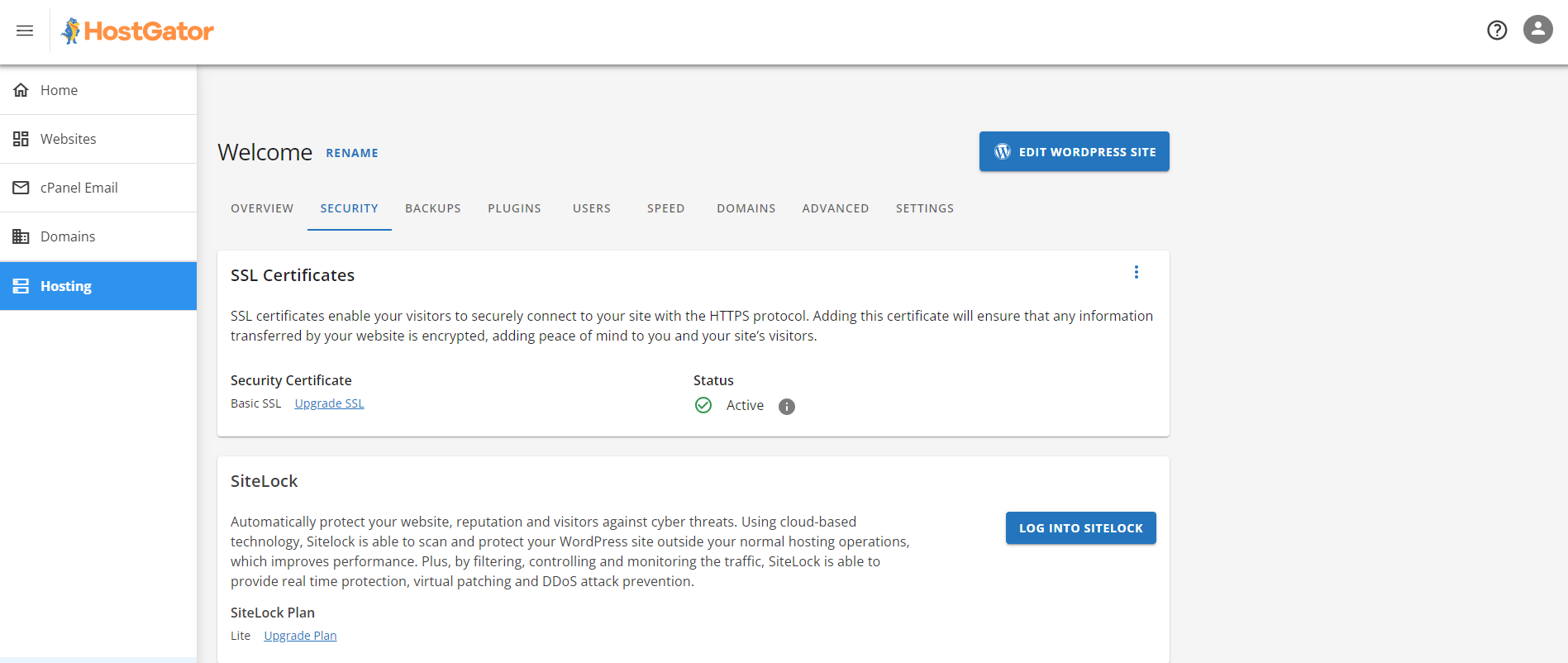
Servers by HostGator are protected by a firewall and intrusion detection software. All plans include DDoS protection, and automatic malware scans that remove threats, while additional security can be added, such as IP banning of risky countries.
Similarly, GoDaddy SSL certificates are free for one year on the Economy Plan ($99 renewal fee) and for the entire time on the other plans. It also provides a basic firewall, DDoS protection, and malware scanning powered by Sucuri.
For detecting vulnerabilities, GoDaddy offers automated web application security checks and server trackers for unusual activity alerts. Additional site backup and retention services can be purchased at an additional cost of between $2.99 and $12.99 per month.
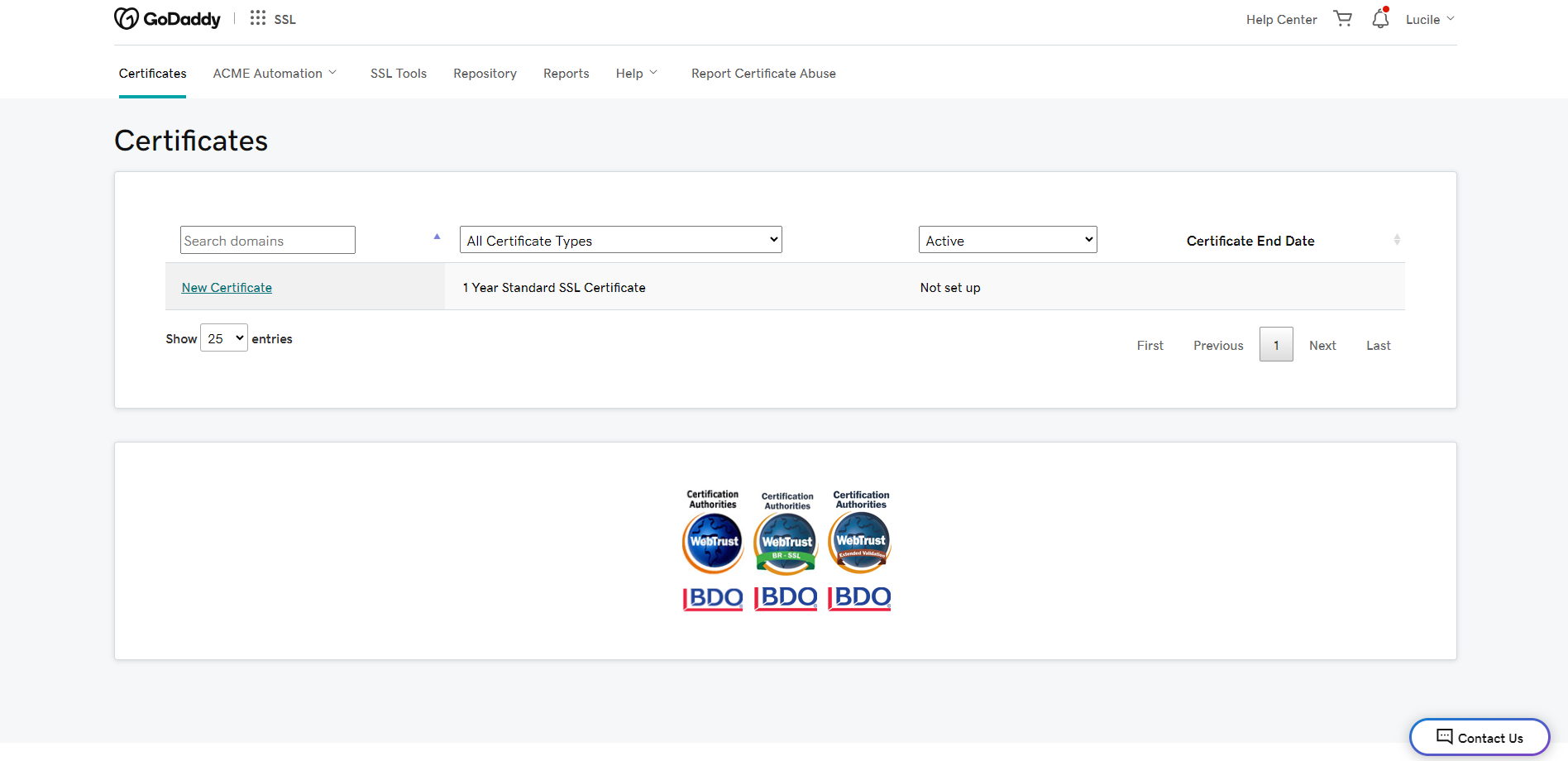
So, to round it off, both HostGator and GoDaddy cover the fundamentals of web security reasonably well for shared hosting services. HostGator stands out for including certain features like dedicated IPs and advanced SSL certificates by default, whereas GoDaddy requires upgrades. For users handling financial data, HostGator’s security options may provide more robust protection.
The Winner
The winner is HostGator with SSL & dedicated IPs across all plans
Customer Support
When launching that shiny new website, knowing which dedicated support crews have your back 24/7 provides great peace of mind. On that front, both HostGator and GoDaddy offer standard assistance channels like phone, live chat, and knowledge bases to keep your site up and running.
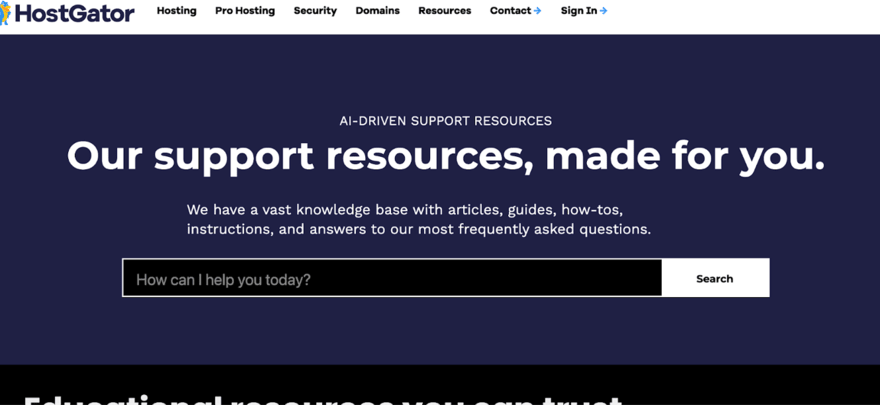
We think HostGator slightly edges it, though. While both shine with round-the-clock availability for all users via instant live chat, direct phone access, and resources sections, HostGator offers tech tickets, meaning you can get help faster and more direct and hands-on support.

For extra assistance, HostGator provides reams of tutorials, videos, how-tos, and a community forum for advice from fellow users alongside formal documentation. And its support consistency and problem-solving knowledge can facilitate those dreaded troubleshooting journeys when inevitable issues arise.
GoDaddy also impresses here, supplying the basics through DIY articles and webinars that excel at nurturing newcomers rather than solving coding crises quickly. In the end, having staff that intimately knows the ins and outs of site management, security, and performance can make the hosting experience that little bit more understandable and easy to navigate.
The Winner
The winner is HostGator thanks to its tech tickets
How We Test Hosting Providers
At Website Builder Expert, we conduct extensive research on web hosting providers, analyzing them across five key areas: price, performance, features, security, and help and support.
Our research team studied 13 top hosting providers across these categories, examining 360 data points within over 2,000 hours of research.
We gather real-world performance data and customer feedback and adjust scoring algorithms based on hosting type to provide a clear picture. This in-depth, unbiased process results in tailored recommendations that website owners can trust to meet their unique needs.
Summary: HostGator Versus GoDaddy
Despite some overlapping strengths, HostGator is the top choice over GoDaddy for most website owners needing a reliable, full-featured hosting solution. With excellent uptime, tight security protections, responsive support, and affordable price, HostGator offers exceptional value across a range of key points.


3 comments